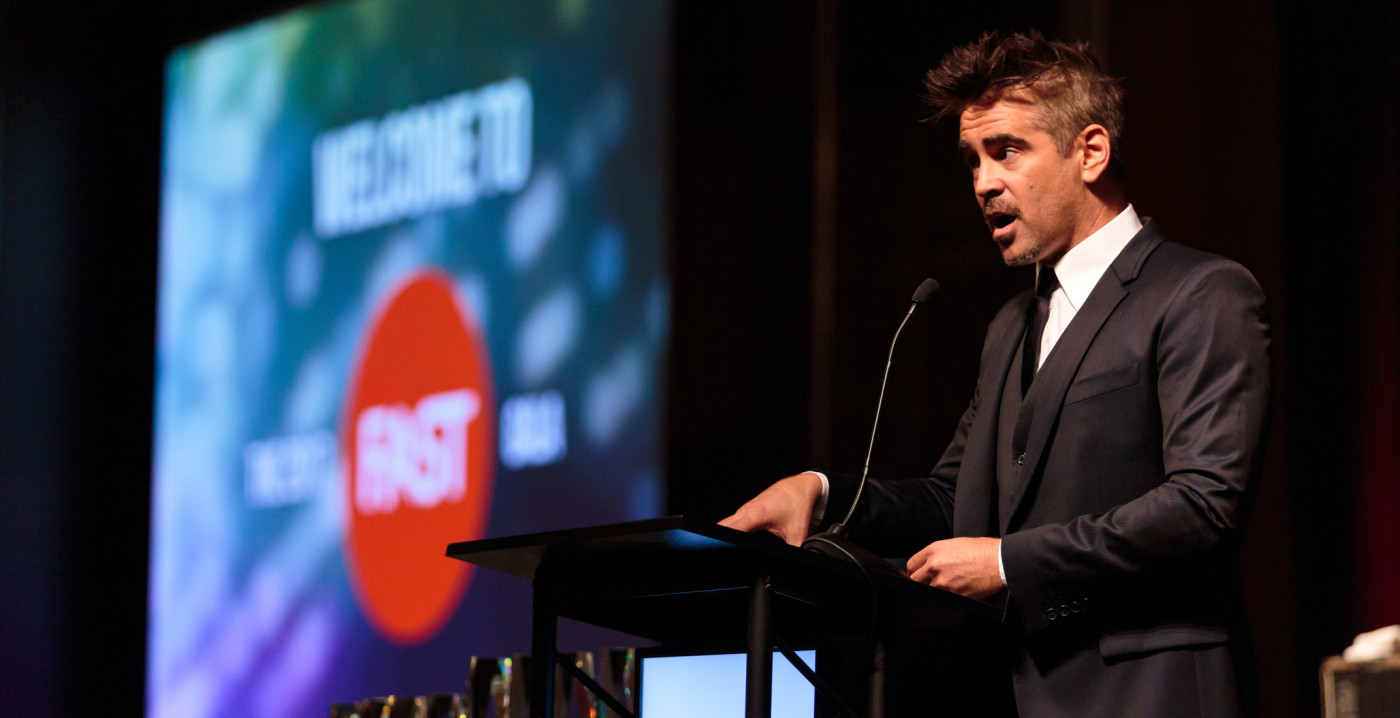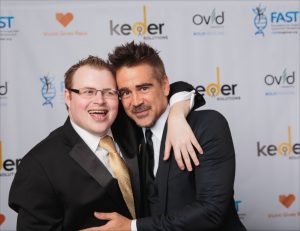FAST Summit & Gala Lures 1,300 to Chicago, Raises $4 Million for Angelman Syndrome Research

Hollywood star Colin Farrell addresses a crowd of nearly 1,300 at a fundraiser for FAST (Foundation for Angelman Syndrome Therapeutics) at the Hyatt Regency in Chicago. (Photo by Wes Craft)
This year’s FAST Summit & Gala in Chicago generated a record $4.1 million for Angelman syndrome research — more than triple the $1.3 million raised at the 2016 gala.
Colin Farrell and other Hollywood stars who attended the dinner on Dec. 2 helped attract nearly 1,300 people to the two-day event that started Dec. 1.
“There was a completely new dynamic in the room,” Allyson Berent told Angelman Syndrome News in a phone interview. She is the chief scientific officer of FAST, the Foundation for Angelman Syndrome Therapeutics.
“I think the urgency is very clear. The landscape has gone from basic science to meaningful therapeutics,” Berent said. “The pre-clinical [trial] work in animal models has been so promising, and that’s really because — as an organization — we have funded over $8 million in research in the last 12 months.”
About 700 people attended science and education meetings at the summit. More than a dozen scientists discussed research breakthroughs.
The speakers included gene therapy pioneer Dr. James M. Wilson of Penn Medicine’s Orphan Disease Center, Dr. Ashley Winslow of the University of Pennsylvania, Dr. Arthur Beaudet of Baylor College of Medicine, Dr. David Segal of the University of California at Davis, Dr. Scott Dindot of Texas A&M University, and Drs. Edwin Weeber and Kevin Nash of the University of South Florida.
“Traditionally, we’re all competitors, but FAST has been able to build bridges where they didn’t exist before — between biochemists and geneticists, between those who study seizures and brain activity and those who look at cognitive systems,” Weeber said. “We’re all now looking at Angelman syndrome together in a different way, from multiple viewpoints.”
Angelman symptoms include profound intellectual disability, lack of speech, movement difficulties, sleep and behavioral problems, and seizures. Yet children with the disorder often appear happy because frequent laughing and smiling are also symptoms of the disease, whose incidence is estimated at one in 15,000 births.
Actor Colin Farrell assures audience ‘a cure is coming’
Farrell, an Irish actor known for his roles in the movies “Tigerland,” “Phone Booth,” “Minority Report,” “Intermission” and “Cassandra’s Dream,” has been involved with FAST for more than a decade. That’s because his 14-year-old son James was diagnosed with Angelman at age 2.
“The future for all of our children is at a crossroad,” he said at the Chicago dinner. “A cure is coming, and this is legendary.”
Other celebrities who attended the gala included Christina Applegate, Jai Courtney and Taylor Lautner. Headliners at previous galas have included Retta, Vincent D’Onofrio, Rosie Perez, Zachary Levi, Wilmer Valderrama, Jesse Lee Soffer and Richard Marx. Each of the actors has ties to someone with Angelman syndrome.
Berent said one of FAST’s missions is bringing Angelman therapies that show promise in mice and rats to human clinical trials. The organization has raised close to $15 million for research since its founding.
A New York veterinarian, Berent said her 3-year-old daughter Quincy was diagnosed with Angelman seven months after birth.
“We got very involved in learning the science,” she said. “I spent a lot of time translating the science to other parents, because there was a real disconnect between what was happening in the lab and what we can expect for our children. And the more we understand as families, the more we can do to support research.”
New clinical trials announced
Creating excitement in the Angelman community is the fact that clinical trials of some therapies are underway, and more are expected.
During the conference, Disruptive Enterprises of Durham, North Carolina, announced it would start a trial of an oral ketone supplement for children 4 to 11 years old. Ketone, which has shown promise in mouse models, improves cognitive function, learning, memory and coordination, and reduces seizures, researchers say.
In addition, New York-based Ovid Therapeutics announced the results of a Phase 1 trial of its therapy OV101 in adolescents with Angelman and Fragile X syndrome. The company said that the patients tolerated the treatment well, and that it worked in children’s bodies similar to the way it works in adults.
The results prompted the company to add adolescents 13 years and older to the adults it will include in its Phase 2 STARS trial.
“This first clinical data of OV101 in adolescents in genetically defined disorders with GABA hypofunction provide important information to our overall development strategy and are an important step to enable development of OV101 in younger ages,” Dr. Amit Rakhit, Ovid’s chief medical and portfolio officer, said in a press release. GABA hypofunction refers to diminished function of gamma-aminobutyric acid, which transmits signals between nerve cells.
“Angelman syndrome and Fragile X syndrome are disorders that impact patients from birth, and our goal is to develop a therapy for a broad range of patient age groups,” Rakhit said. “At Ovid, we strive to provide access to effective therapies as early as possible, and we are now able to offer enrollment in our STARS trial to adolescent Angelman syndrome participants.”
Rakhit said results of the STARS trial will be available in late 2018.
Earlier this year, Agilis Biotherapeutics of Cambridge, Massachusetts, presented the results of its gene therapy program for Angelman at two international conferences. The company develops DNA treatments for rare central nervous system diseases.
Also in 2017, F. Hoffmann-La Roche teamed up with FAST and the Angelman Syndrome Foundation on the first phase of a study dealing with Angelman treatment development and clinical trial design.
Paula Evans, who chairs FAST from the Chicago suburb of Darien, called the recent gala “the largest, most successful Angelman event in the world.”
“This event signified a complete tidal shift in developing treatments and a cure — not only due to the money raised, which was absolutely astounding for a rare disorder — but also because we had some of the world’s top Angelman scientists and geneticists,” she told Angelman Syndrome News. “We have six different gene-editing strategies, five of which should be in clinical trials in the next 18 to 36 months.”
She added: “We are confident that a treatment and cure is possible in just a few short years. Money and time are the only things that stand in our way.”









